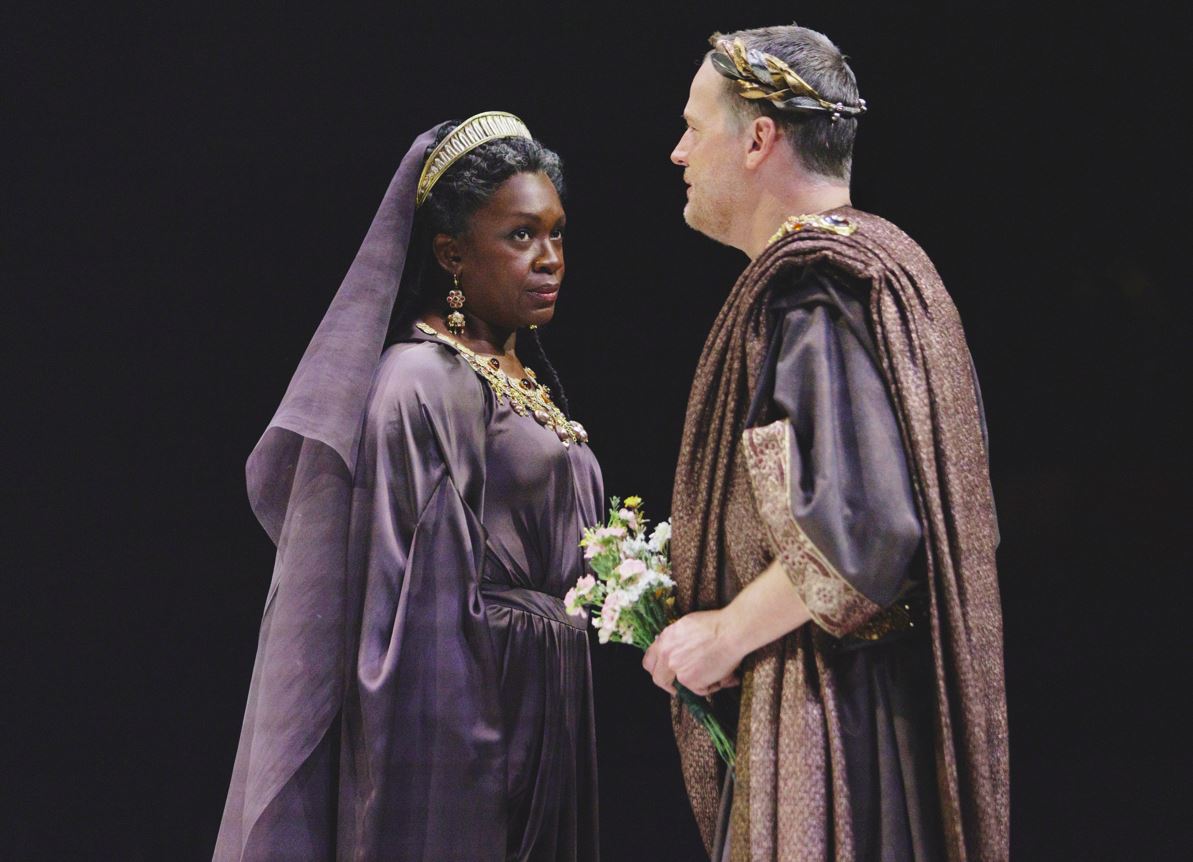 CLICK TO VIEW THE WHOLE PUBLICATION ONLINE
CLICK TO VIEW THE WHOLE PUBLICATION ONLINEThe Stratford Festival, which started as a theatre to produce Shakespeare’s plays, has moved a long way from 1953, the year it was founded, That was inevitable and acceptable. It could not survive if all eleven productions on deck for this year were plays by Shakespeare. But he does get three plays, Macbeth at the Avon, The Winter’s Tale at the Tom Patterson Theatre and As You Like It at the Festival Theatre.
The Winter’s Tale is directed by Antoni Cimolino, the Festival’s Artistic Director and we are accustomed to expecting a superlative production. We are not disappointed. The Winter’s Tale is one of Shakespeare’s last plays and scholars can’t quite agree on what kind of play it is. Comedy, tragedy, pastoral, romance and combinations of these are posed as possible classifications but for theater lovers, who cares? We want to see a good production.
Cimolino chooses the best actors from the large pool of available talent and does wonders with a play that has some creaky scenes.
The play opens with a child playing with a lit ball and a woman dressed in white and wearing body-length angel’s wings. She is Lucy Peacock playing Time, the chorus of the play who appears in Act 4 to tell us that 16 years have passed since the action of the first three acts. She speaks in turgid rhyming couplets. Cimolino has given her some lines for the opening of the production and the presence of the child Prince Mamillius may be viewed as a unifying element in the play. As for Peacock in the tiny role of Time, it is a waste of her prodigious talent.
After the short visit by Time, the play continues with the expression of great childhood friendship between King Leontes of Sicilia (Graham Abbey) and King Polixenes of Bohemia (Andre Sills).Things fall apart quickly when Polixenes after a nine month visit to Sicilia, refuses to stay another week despite his friend’s entreaties. Leontes asks his wife Hermione (Sara Topham) to entreat him to stay and he agrees. Leontes becomes convinced that Hermione is unfaithful to him with Polixenes and goes into murderous jealousy. The friendship is over and he orders his faithful Camillo (Tom Rooney) to poison Polixenes and and is prepared to kill his wife and son.
This is powerful drama that is superbly executed. Leontes goes berserk with his unfounded suspicions and sends emissaries to the oracle at Delphos but no evidence to the contrary touches him. He sends his just-born daughter to be exposed to the elements to die and of course is beside himself with fury when he finds out that Camillo has gone to Bohemia with Polixenes.
Abbey, Rooney, Sills and Topham give bravura performances. Topham stands her ground denying any infidelity and we watch a dignified and marvelous Hermione. Her friend Pauline (Yanna McIntosh) gives an exemplary performance as a woman of courage and fortitude who stands up to Leontes fearlessly and effectively.
Leontes’ daughter is found by the Old Shepherd (Tom McCamus) and the Young Shepherd his son (Christo Graham). They raise her as their own, name her Perdita (Marissa Orjalo) and she grows up into a beautiful woman. The tenor of the play changes. The Young Shepherd is a Clown and he plays for laughs. There are some laughs in the handling of the baby. Graham does a hilarious routine of body movements that evoke laughter. When the Old Shepherd finds gold with the baby he collapses on the floor.
The conman Autolycus (Gerain Wyn Davies) fingers people’s wallets and is very funny. Camillo and Polixenes don on ridiculous disguises to spy on Perdita and Polixenes’ Florizel (Austin Eckert). The last two are in love but her royal origin is unknown. Camillo and Polixenes do double-takes and act ridiculously. When Polixenes finds out that his son wants to marry a commoner he turns ugly and denounces his son. But their scenes are done for fun and laughter and Cimolino is a master at that.
In addition to the above, there is a sheep-shearing festival with shepherds, shepherdesses, and colorfully dressed satyrs dancing joyfully to the choreography of Adrienne Gould and having a grand time. Leontes’ dreadful behavior is finally cleansed and repentance, forgiveness and reconciliation are achieved. Hermione returns to life miraculously, Florizel and Perdita get married and so will Camillo and Paulina. The world is returned to order, society is reestablished and we have nothing to worry about as the actors take their bows and we leave the theatre.
The Patterson is a theatre-in-the-round and the opportunity for set design is limited. The costumes by Francesca Callow are Greco-Roman and there is great reliance on lighting by Michael Walton to indicate the mood of the play.
Cimolino deserves a standing ovation for his sound judgment, meticulous care and brilliant directing of a play that has its virtues but contains many pitfalls. He avoids the pitfalls and delivers an extraordinary production
THE WINTER’S TALE by William Shakespeare opened on May 30 and will play until September 27, 2025, at the Tom Patterson Theatre, Stratford, Ontario.






























